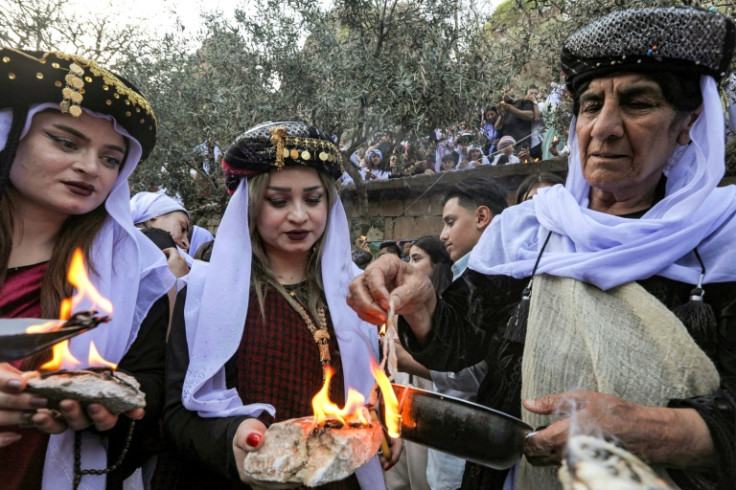Iraq's Yazidis: Reclusive Group Hunted By Islamic State

The Yazidis, who Britain on Tuesday officially acknowledged as victims of "acts of genocide" by the Islamic State (IS), are a Kurdish-speaking ethno-religious minority found mainly in Iraq.
IS jihadists carried out horrific violence against the community in 2014, killing men en masse and abducting thousands of girls and women as sex slaves.
Here are some key facts about the Yazidis:
The Yazidis are followers of an ancient religion that emerged in Iran more than 4,000 years ago and is rooted in Zoroastrianism.
Over time it has also absorbed elements of Islam and Christianity.
Organised into three castes -- sheikhs, pirs, and murids -- Yazidis pray to God facing the sun and worship his seven angels, led by Melek Taus, or Peacock Angel.
Their holiest site is Lalish, a stone complex of shrines and natural springs in Iraq's mountainous northwest.
Yazidis discourage marriage outside of their community and across their caste system.
Their beliefs and practices include a ban on eating lettuce and wearing the colour blue. Some Muslims wrongly accuse them of being devil worshippers.
The community was persecuted during Ottoman times and also under Iraqi dictator Saddam Hussein.
Of the world's nearly 1.5 million Yazidis, the largest number -- 550,000 -- lived in Iraq before the IS offensive in 2014.
The Sunni extremists attacked the Yazidi bastion of Sinjar in August 2014, killing more than 1,200 people, leaving several hundred children orphaned and destroying nearly 70 shrines, according to local authorities.
A further 6,400 Yazidis were abducted, around half of whom were rescued or managed to flee.
After the massacres, some 100,000 Yazidis fled to Europe, the United States, Australia and Canada, according to the UN.
Among those who found refuge in Germany was 2018 Nobel Peace Prize winner Nadia Murad who was captured, raped and forced to marry a jihadist before she was able to escape.
In May 2021, a special UN investigation team said it had collected "clear and convincing evidence" that IS had committed genocide against the Yazidis.
Six months later, a German court was the first in the world to recognise crimes against the Yazidi community as genocide.
On Tuesday, Britain's government officially acknowledged that IS had committed "acts of genocide" against the Yazidis.
Germany's lower house of parliament in January also recognised the 2014 massacres as "genocide", following similiar moves in Australia, Belgium and the Netherlands.
© Copyright AFP {{Year}}. All rights reserved.





















